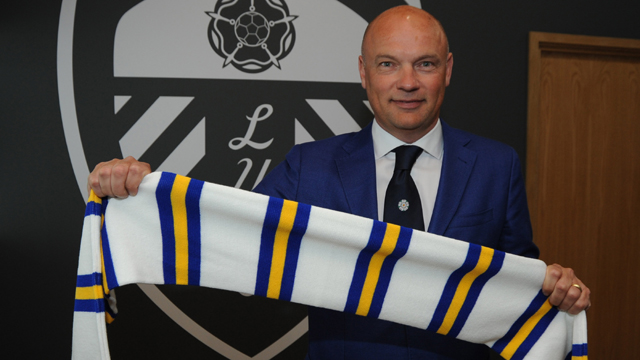 Part
2 Sombrero Steve - Results, table and transfers
Part
2 Sombrero Steve - Results, table and transfers
'Life is a challenge and I know what I'm getting myself into. But I'm
thriving on pressure and I'm thriving on challenges all my life. I'm a
hard-working person. It's the way I grew up, the way I played the game;
the way I deal with personal problems and the way I manage. You need those
qualities to make it count here. My experience of 10 years as a head coach
will allow me to do that.'
Thus, Uwe Rosler introduced himself to the public as head coach of Leeds
United on 20 May 2015, the fifth man to hold the post since the arrival
of Massimo Cellino a year earlier.
The challenges which Rosler referred to were many. He had been brought
up in Communist East Germany under the notorious eye of the dreaded secret
police, the Stasi, and went on to defeat lung cancer after doctors diagnosed
a tumour the size of a tennis ball pressing against his windpipe. Could
this Boy's Own hero finally put an end to the revolving door syndrome
that had engulfed the club?
Rosler had a glass of water in front of him when he was asked how he
would cope with a man who changed coaches more quickly than some people
changed underwear.
'I don't know how you guys feel, but I'm very happy,' he said. 'For me
that glass is half-full and not half-empty. That's my philosophy in life.'
Rosler gave Neil Redfearn credit for his six months in charge and said
he understood the public support for him. 'Neil took over the club last
year and it was in a dangerous area but he lifted the players together
and stabilised the club very well, there's a good foundation to move on
from.'
Rosler made his managerial name at Brentford after five years cutting
his teeth at Lillestrom, Viking and Molde. The West London side qualified
for the League One Play-Offs in 2013 and were in the mix for promotion
when the German left for Wigan in November of that year.
Rosler's impact at the DW Stadium was instant and at the end of his first
season, the club came remarkably close to defending the FA Cup and lost
in the Championship Play-Off semi-finals. But the project fell apart a
year later with high-profile players who were open to one year in the
Championship balking at the idea of a second. Rosler was sacked in December
with Wigan on the way to relegation.
Cellino, perhaps wisely, was absent from Rosler's unveiling in the Bremner
Suite at Elland Road, where five days earlier he had presided over a thoroughly
disorderly and chaotic press conference.
Sitting alongside the impassioned Italian that afternoon was Adam Pearson,
and it was he who chaired Rosler's introductory session, a far more orderly
and structured affair.
The slick meeting was comfortably under half the length of Thursday's
rambling soliloquy and achieved far more.
Pearson, just over a week into his post, delivered an immaculate performance
and showed just why he 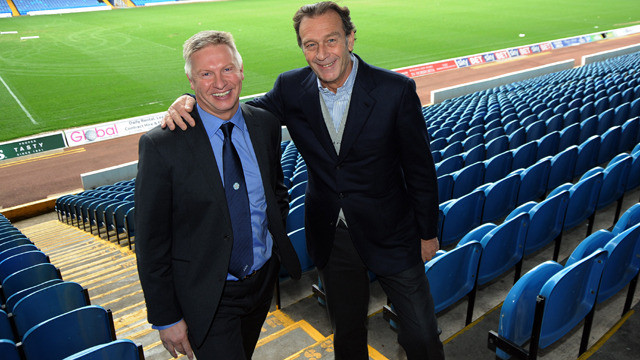 had
been brought to the club by Cellino.
had
been brought to the club by Cellino.
Pearson said Rosler was chosen from a list of candidates which ran to
hundreds.
After the lack of clarity surrounding the issue of Redfearn, Pearson
provided clear answers when it resembled the elephant in the room five
days earlier.
It was a refreshing departure from the unconvincing utterances of David
Hockaday just a year earlier, when he spoke about making Leeds 'the hardest
working team in the league' and the colourless refrains of Darko Milanic
as the leaves fell in the autumn.
back to top
There were clear messages about Rosler's footballing beliefs, powerhouse,
high-voltage, 'Heavy Metal' football as Rosler put it. It mirrored the
approach favoured by the dynamic Borussia Dortmund side of Jurgen Klopp.
'It's important for me to win the ball and play a high-pressing game,'
said Rosler, 'to force the opposition to make mistakes and to play the
ball in areas where we can attack quickly. We also have to have a plan
for when we play against established defences but I like very powerful
quick football, that sort.'
Rosler's formation of choice was 4-3-3. 'It can pressure the opposition
high up the field,' he said. 'You need a high level of fitness and energy.
I like to have pace on the sides. My alternative system is a 3-5-2 where
we play with two strikers. I did that at Wigan and did it successfully
in the FA Cup against Premier League opposition. That would be Plan B.'
With Leeds finishing the previous season in 15th place, Rosler said tenth
would represent an advance. 'I think that would be progression, competing
with the clubs on parachute payments which are getting bigger and bigger.
I would call that a successful season.'
Rosler indicated that his preferred role was working under a head of
recruitment, having successfully operated alongside a sporting director
in Mark Warburton at Brentford and others in his time on the continent.
That ticked one of Cellino's boxes.
On his first dealings with the Italian, Rosler said, 'I thought it was
very interesting and I really enjoyed it. He is a very knowledgeable football
man and we talked a lot about tactics. I showed him a presentation of
my style of play and we discussed a lot of football and I think he has
got a pretty good idea of what I am looking for in terms of recruitment.'
It was reminiscent of Hockaday's introduction but with no references
to salt and pepper pots.
Paul Watson took a wry slant on things for FourFourTwo:
Leeds United have parted company with Uwe Rosler after the German manager
failed to deliver the expected results in his first 14 seconds in charge.
After a frustrating period of slow, steady progress under Neil Redfearn,
the volatile Italian owner had believed Rosler would be the man to deliver
success on a more acceptable timescale.
Cellino began the unveiling press conference looking relaxed and confident
in his appointment, taking time to regale the press hordes with a detailed
analysis of the Italian legal system, jurisprudence in Italian business
and cats.
But things began to go awry when Rosler was invited to speak. Before
the former Brentford boss had even finished his introductory sentence,
Cellino began to mutter, cutting him off entirely before he could develop
what appeared to be a promising second sentence.
‘On behalf of everyone at Leeds United I would like to thank Uwe for
his service,’ Cellino declared, drowning out Rosler’s 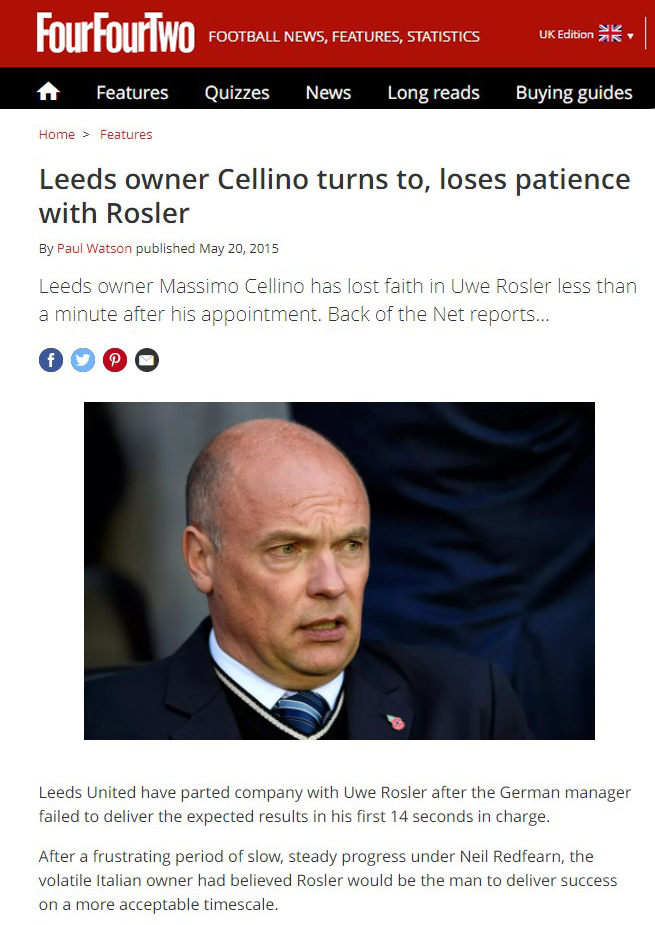 attempts
to praise Cellino’s long-term vision for the club.
attempts
to praise Cellino’s long-term vision for the club.
‘We all appreciate his dedication and hard work and wish him the best
in his next role.’
While a confused Rosler went off to introduce himself to and say farewell
to his new and former players, Cellino analysed Rosler’s reign. ‘Are we
a better club than we were 14 seconds ago? I would say that we are,’ Cellino
told FourFourTwo.
‘But we need to get Leeds back where they belong in the Premier League
and we’re not going to achieve that with adverbs or prepositions. If we’re
not in the Champions League by September then something has gone badly
wrong.’
During his career to date Cellino has been accused of impatience, having
sacked around 160,000 coaches, many of whom were not even employed by
him.
It was all good stuff and almost too close to the mark.
Only time would tell whether Rosler would be given longer to prove his
managerial worth than the four men that had already been victims of Cellino’s
whimsical moods. A period of stability was an absolute necessity for Leeds
United as it once more set course on a voyage into the unknown.
Certainly, Cellino spoke highly of Rosler as he appointed him and gave
a rosy view on the club's financial health.
'People told me Leeds was a sleeping giant, but when I came here, the
giant was dead. So why did I choose Leeds? I bought Leeds because I know
they are better than many Premier League clubs. I could have bought Premier
League clubs for less money than I am spending at Leeds - I want the fans
to understand that.
'When we go into the Premier League, we will go into the Premier League
to get to the Champions' League. We will not go into the Premier League
to pay our debts. We will not go into the Premier League to be relegated.
back to top
'When I first came in, I had to pay £5 million just to keep the club
going. By the end of last season, we had lost £22 million. Now the forecast
is that we are close to break even. We also had big wages last year. Nearly
£21 million in wages and we had an average age of 29. Now we have brought
it down to £10.5 million, but we have to attract new players, so it will
go up to £13 million and the average age is now 23.
'I wanted someone who is a good, experienced coach in the Championship.
Uwe is German, but he knows England and how to get foreign players used
to playing here. He's a very well-organised guy. He suits my mentality
because I like to have control of everything.
'A coach with good potential can realise his potential if the club is
strong to look after him. If you leave him alone too much, it can kill
him. Why does he have to buy? He should propose [deals to the owner].
That is the big mistake they make in England. We have to work together,
we share the responsibility. If we choose a player together and we make
a mistake, it is our mistake, not his.'
United had released nine players at the end of their contracts, including
Aidy White and Rudy Austin.
Both Elland Road favourites, they had scored the goals that delivered
the scalp of Premier League Everton in the League Cup.
Austin was a cult favourite and fondly remembered, despite having a stop-start
time at the club.
'I enjoyed it very much,' he told the Jamaica Observer. 'I loved
playing for the fans and loved playing for the club, it was fantastic.
Sometimes I got injuries which forced me to miss a couple of games, but
it was always a pleasure going out there and representing the club
'Every away game you go the stands are full - that's the passion the
club displays. The people take the football very seriously, they love
the club and the atmosphere at Elland Road is always pumping.'
Asked about the fans chanting his name, Austin added, 'It's very good,
it gives me more  energy
when I'm playing because I consider myself an honest player who just goes
out there and does the dirty work, so to speak. They appreciate that and
they love to see you give your all going into tackles and just giving
110%.'
energy
when I'm playing because I consider myself an honest player who just goes
out there and does the dirty work, so to speak. They appreciate that and
they love to see you give your all going into tackles and just giving
110%.'
The club had not clarified whether any of the previous year's seven loanees
would return to Elland Road but Cellino had decided Flamengo's Adryan
would not be retained, accepting the Brazilian was unsuited to English
football.
Sol Bamba was looking for a permanent deal at Elland Road, having finished
the Championship term on loan from Palermo. However, the 31-year-old had
signed off his time with some critical comments about Cellino's running
of the club and the decision to remove Steve Thompson.
'Even the manager, some of the players are not happy with [Cellino],'
said Bamba. 'That's football, you can't keep everyone happy, but I think
everyone recognised what [Thompson] was doing at the club and I was affected
more than the other ones because I knew him from my time in Leicester,
and I can't hide my feelings.
'When some things are bad, I say. We had a few chats when he left, some
of the players think it was the right decision and fine, and I think it
wasn't.
'I don't know what is going to happen with me. But it doesn't matter
if I am staying or not. The club deserves better and I think the person
in charge has to do better for our club and the supporters because they
deserve better.
'I want to stay at the club but not for the wrong reasons. If he decides
not to keep me because of what I am saying, that's up to him, but I can't
just hide my feelings, and when I think someone deserves something, I
say it. If he thinks I shouldn't say it, that's up to him, I speak the
truth.
'Everyone can see [Redfearn] knows the club from bottom and he has brought
some good young players into the first-team and is a Leeds fan. I think
there is no other man better for the job.'
Asked if Bamba might sign again, Pearson said: 'He could well do. We've
literally had no formal recruitment meeting at all and we know we're perhaps
a week behind where we should be.
'But we'll very quickly get up to speed and the key people are close
to coming in. Uwe is pretty clear on what he wants to come into the club.
You'll start to see some movement pretty quickly. We won't hang around.'
Cellino gave Rosler money to spend. Bamba's move was made permanent in
a £1 million deal and he was appointed club captain. Recruitment was mainly
in attack with £3 million Chris Wood, £1.3 million Stuart Dallas, and
£1 million Jordan Botaka arriving.
24-year-old Dallas was a Northern Ireland international with a couple
of years under his belt playing for Rosler at Brentford.
He broke through at Crusaders in 2010 with a wonderful debut season,
winning both the Northern Ireland Football Writers' Player and Young Player
of the Year awards and making his full international debut.
He played in the Europa League against Fulham the following season before
Rosler took him to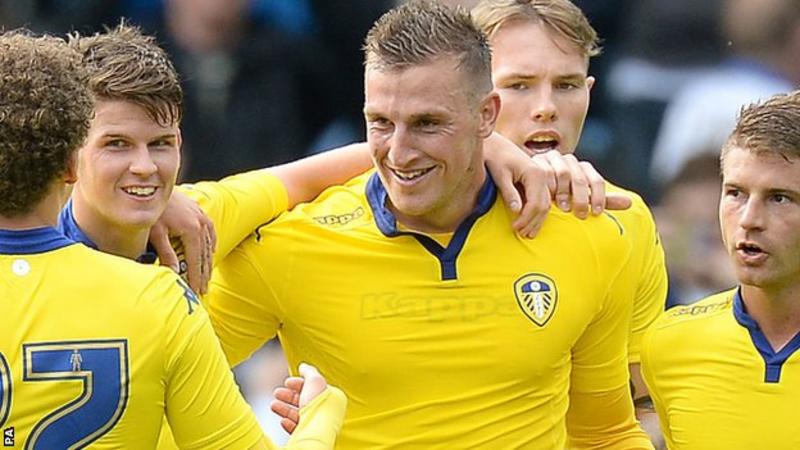 Brentford in 2012.
Brentford in 2012.
He struggled to break through initially and spent some time on loan to
Northampton, but on his return to Brentford he made 21 appearances in
2013/14 as the Bees won automatic promotion to the Championship.
back to top
He came into his own the following year when he was almost an ever-present
and scored twice in the 4-1 win over bitter rivals Fulham at Craven Cottage
on 3 April, the second winning the club's Goal of the Season Award. It
helped them qualify for the Play-Offs, though they lost to Middlesbrough
in the semi-finals.
A predominantly right-footed player, Dallas was nevertheless played regularly
from the left at Brentford where he could cut in. Rosler saw him as a
solution to Leeds' renowned lack of width.
Rosler admitted his surprise that Leeds were able to afford the signing
of Wood from Leicester and paid tribute to Cellino for sanctioning the
purchase.
Leeds fought off competition from several other clubs to sign Wood, and
Rosler believed it was the size of the club rather than the money on offer
that convinced the New Zealand striker to move to West Yorkshire.
There was positivity among the fans about Rosler. 'He seems to just get
Leeds,' they said. 'Not felt this positive about a coming season for years.'
While many were still aggrieved at the replacement of Neil Redfearn,
who was rapidly approaching the status of legendary cult hero, they began
to move on, invigorated by the hopes that finally Leeds had a decent manager
with a track record who could steer them to promotion.
The first test came at home to relegated Burnley on a glorious sunny
day on 8 August. Elland Road was a cauldron of opening day noise in front
of the Sky cameras.
Rosler gave debuts to Wood and Dallas, alongside Tom Adeyemi, a strapping,
24-year-old holding midfielder signed on a season-long loan from Cardiff
City.
Sol Bamba and Giuseppe Bellusci were paired in the centre of defence
with Lewis Cook and Alex Mowatt partnering Adeyemi in a midfield with
an average age of 21. Rosler set his side up in a 4-3-2-1 formation with
Sam Byram and Dallas flanking Wood.
Burnley were first to show and Charlie Taylor appeared to drag down Lukas
Jutkiewicz in the box but referee Kevin Friend ignored the appeals.
Leeds bounced back with Byram rounding his man and hitting the byline
after eight minutes to float over a gorgeous cross. Wood made a real hash
of a spectacular scissor kick but Dallas seized on the loose ball only
for goalkeeper Tom Heaton to deflect his strike onto the underside of
the bar and away.
After a quarter of an hour Leeds were caught napping down the left and
the ball was heading towards Jutkiewicz in the middle of the area when
Bellusci handled under pressure. The referee again waved away the appeals.
After Mowatt's low shot clipped the outside of the post, Rosler brought
Antenucci 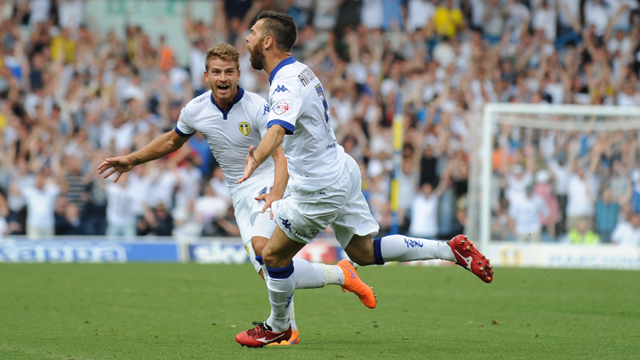 off
the bench on 70 minutes. He changed the game, making space on the edge
of the box in the 82nd minute to fire a stunning left-foot curler into
the far corner.
off
the bench on 70 minutes. He changed the game, making space on the edge
of the box in the 82nd minute to fire a stunning left-foot curler into
the far corner.
Rosler and the 28,000 crowd went wild with excitement.
It looked odds-on the winner but three minutes later Sam Vokes soared
above everybody else to head home a splendid equaliser and secure Burnley
a point.
The investment showed, with Wood an attacking focal point, though he
had a difficult debut against a strong defence.
There was a warm feeling around Elland Road despite the loss of a point.
Burnley were among the promotion favourites and Leeds had shown they could
match them.
Three successive draws dampened the enthusiasm, with the middle one at
Bristol City feeling more like a defeat as Leeds surrendered a 2-0 lead
at the death. Substitute Kieran Agard fired in off the near post from
inside the area with a minute to go.
Six minutes of injury-time were added on and Aden Flint scrambled in
a last-gasp corner from close in to ensure the spoils would be shared.
The fans complained bitterly that Rosler had been too conservative, settling
for the 2-0 lead and inviting Bristol back into the contest. 'Such a negative
manager, has no bottle about him. We will never get promoted under this
guy.'
back to top
The mood was restored by victory at Derby. Wood notched the winner with
two minutes left, turning on the edge of the area before smashing the
ball home.
'Best performance of the season', crowed the fans, but their mood dipped
again as Rosler's inherent caution began to eat away at the players' confidence.
In a dismal 3-0 defeat at Middlesbrough, it vanished completely. 'The
scoreline did not reflect the game,' complained the German.
He was downbeat again after Leeds lost 2-0 at home to Birmingham. 'It
was a bad day at the office…The players want to do well, they prepare
well and train well but for some reason we don't get the best from them
at Elland Road…I am not panicking because I believe in the players. We
have to be mentally stronger, more ruthless and aggressive and show a
nasty streak. Right now, it looks like the shirt is too heavy for some
of our players so I'm going to have to find a way for us to reach our
full potential, particularly at home.'
One had to go back ten games, to early March, for Leeds' last home win.
In that time they had managed five points and four goals.
One disgruntled supporter complained, 'With more talent at his disposal
than the last lot could have dreamed of, Rosler has assembled a scared
looking bunch of players so rigidly adhering to his game plan that we
have become predictable both to watch and play against. If this is Heavy
Metal, give me another form of music.'
With Leeds slipping to 16th, three points above the relegation slots,
the Elland Road clash against Brighton on 17 October was crucial for Rosler.
Less than three weeks earlier, Massimo Cellino had given the German a
ringing endorsement.
'He's doing a beautiful job. It's a team that when it's ready, it's going
to fly,' he said. 'When you lose a game, you think it's the coach's fault
because it's an emotional game. That's during the game because we are
all fans. After 90 minutes you have to go down and become a chairman again.'
The Italian had been distracted in the weeks prior to the game by his
dispute with the Football League, 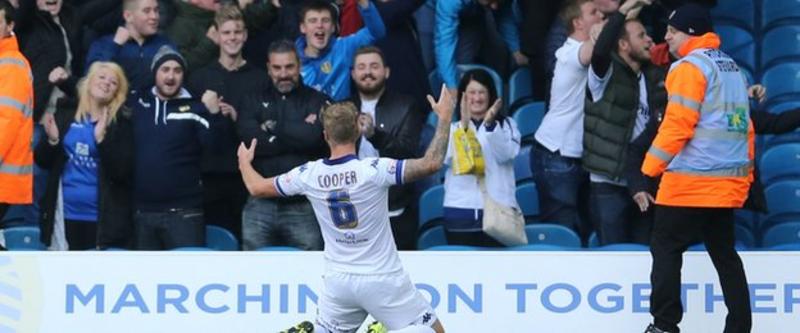 but
you could almost hear his trigger finger twitching.
but
you could almost hear his trigger finger twitching.
Leeds started brightly but after 15 minutes Solly March was played through
on goal and kept his composure to open the scoring.
Leeds responded well and deservedly equalised eight minutes later when
Liam Cooper glanced a header into the net from Alex Mowatt's free kick.
Mowatt came close to giving Leeds the advantage after the break when
he charged down a clearance and the ball hit the outside of the post,
but Brighton gradually took control. March hit the bar and Hemed saw an
effort saved by Marco Silvestri before Bobby Zamora won it with a lovely
finish, chipping Silvestri in the 89th minute. Leeds were down to 10 men,
with Cooper off injured and all three substitutes used.
Cellino was in despair, standing there for a couple of minutes staring
at Rosler on the touchline. He shook his head sadly before leaving the
stand. He had done the same a year before when Milanic's team conceded
the second against Wolves. Rosler's time was up.
The formal announcement came in the early hours of Monday. With United
eighteenth, Rosler became the fifth manager fired by Cellino in 17 months.
'I wanted them to play heavy rock football but instead it was like country
music,' mused Cellino.
'I watched the game on Saturday and in the second half, we were just
trying not to lose. We were not trying to win. That is not good enough.
I did my best to help Uwe, but in the end, I could not see even a patch
of blue in the sky, just cloud, cloud and cloud.'
Part 2 Sombrero Steve - Results,
table and transfers
back to top












 Part
2 Sombrero Steve - Results, table and transfers
Part
2 Sombrero Steve - Results, table and transfers
 had
been brought to the club by Cellino.
had
been brought to the club by Cellino. attempts
to praise Cellino’s long-term vision for the club.
attempts
to praise Cellino’s long-term vision for the club. energy
when I'm playing because I consider myself an honest player who just goes
out there and does the dirty work, so to speak. They appreciate that and
they love to see you give your all going into tackles and just giving
110%.'
energy
when I'm playing because I consider myself an honest player who just goes
out there and does the dirty work, so to speak. They appreciate that and
they love to see you give your all going into tackles and just giving
110%.' Brentford in 2012.
Brentford in 2012. off
the bench on 70 minutes. He changed the game, making space on the edge
of the box in the 82nd minute to fire a stunning left-foot curler into
the far corner.
off
the bench on 70 minutes. He changed the game, making space on the edge
of the box in the 82nd minute to fire a stunning left-foot curler into
the far corner. but
you could almost hear his trigger finger twitching.
but
you could almost hear his trigger finger twitching.